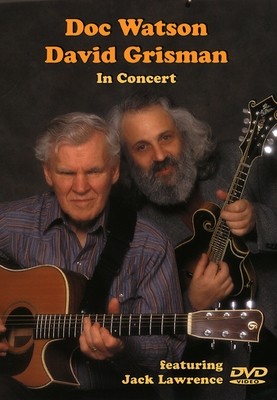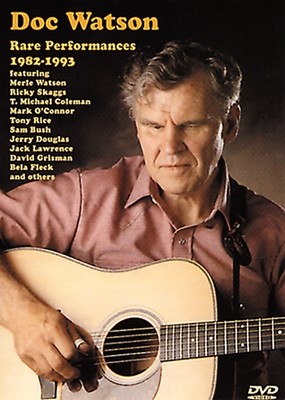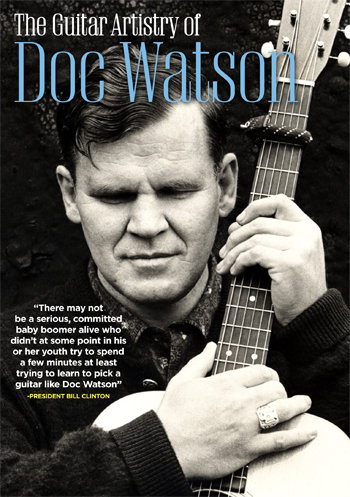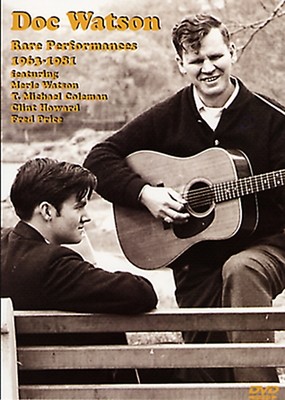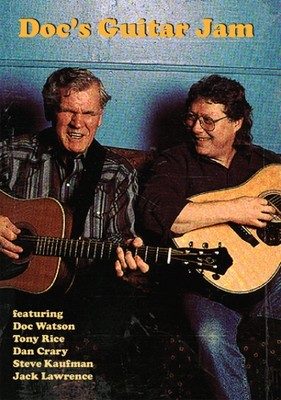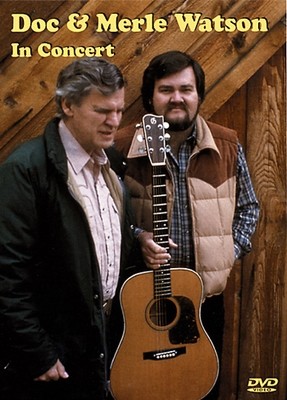
Guitar Artistry of Doc Watson
Doc Watson was a legendary performer who blended his traditional Appalachian musical roots with bluegrass, country, gospel and blues to create a unique style and an expansive repertoire. His flatpicking style elevated the acoustic guitar to solo status in bluegrass and country music, and whose interpretations of traditional American music profoundly influenced generations of folk and rock guitarists.
Doc was born in Deep Gap, North Carolina on March 3, 1923, into a family already rich in musical tradition. His mother, Annie Watson, sang traditional secular and religious songs, and his father, General Watson, played the banjo, which was Doc's first instrument as well. In 1953 Doc met Jack Williams, a local piano player, and played rockabilly/swing music for seven years, a period and a style that he later revisited in the album Docabilly. But he also continued to play acoustic traditional music with his family and with his banjo playing neighbor, Clarence Tom Ashley. In 1960, spurred by the growing folk revival, folklorists Ralph Rinzler and Eugene Earle came south to record Ashley, and heard Doc Watson in the process. These sessions resulted in Doc's first recordings, Old-Time Music at Clarence Ashley's.
In 1961 the Friends of Old-Time Music invited Doc, Ashley, Clint Howard and Fred Price to perform at a now-legendary concert in New York City, and one year later Doc gave his first solo performance at Gerde's Folk City in Greenwich Village. From then on, he was a full-time professional, playing a wide range of concerts, clubs, colleges and festivals, including the Newport Folk Festival and Carnegie Hall.
In the late 1960s, Doc was joined on the road by his son Merle, who provided both musical and emotional companionship; with Merle playing guitar and banjo and serving as partner and driver, the father-son team expanded their audience nationwide. Sadly, Merle died in 1985 from a tractor accident.
A series of over 50 remarkable recordings, including collaborations with Flatt & Scruggs, Chet Atkins and the Nitty Gritty Dirt Band, helped make Doc the gold standard among traditional pickers. Doc passed away in 2012. He was 89.
Titles include: Shady Grove, Storms On The Ocean, Wabash Cannonball, Peach Pickin' Time In Georgia, Daybreak Blues, Windy And Warm, Black Mountain Rag, Medley: Sheeps in the Meadow/Stony Fork; Beaumont Rag, Keep On The Sunny Side of Life, Monkey Around The Winter, Lost John, How Long Blues, Blue Suede Shoes, Shake Rattle & Roll, Bye Bye Blues, St. James Hospital, A Christmas Lullaby, Lee Highway Blues, Medley: Bill Cheatham/Salt; Deep River Blues, Honey I'm Worried Now, Moody River, The Riddle Song, When I Lay My Burden Down, Sitting On Top Of The World, Got The Blues, Can't Be Satisfied, Riding On That Midnight Train, Fire Ball Mail, Tennessee Stud and Daniel Prayed
Running Time: 100 minutes
Review: There never will be someone like Doc Watson again. A man of high integrity, inspirational talent, and a positive force on all of those who met him and heard or saw him perform. The first time this writer saw him perform was almost fifty years ago. His singing and guitar playing were riveting. His "aw shucks" delivery was genuine, and you knew you were in the presence of greatness. These performances here have all those qualities and more.
This program does a good job of presenting his career from the beginning, as a man looking for a way to become the breadwinner in his family, to the fruition of that career when he became an icon for what is good and right about American folk and bluegrass music. Doc Watson had more influence on bluegrass guitar playing than any other non-bluegrass guitar picker. His fiddle tunes, leads, and fills changed everyone's perception of what could be done with a guitar.
Ironically, the first cut features Doc playing banjo on "Shady Grove." Over the years, he was recorded not only singing and playing guitar, but also on banjo, harmonica, and one instance mandolin. In the early days before his son Merle was able to tour with him, Doc preferred the company of folks who made him comfortable away from home. Two of those early travelers are present here for a couple of songs, Fred Price and Clint Howard on "Lee Highway Blues" and "Daniel Prayed." These songs were taken from Pete Seeger's "Rainbow Quest" television show in the 1960s. Merle is featured on a lot of the material and, later, he and Doc are joined by Jack Lawrence on guitar and T. Michael Coleman on bass. Grandson Richard appears near the end of the video.
At a hundred minutes long, there are more than thirty performances ranging through all phases of his career. We get a taste of his rockabilly, his blues, and his bluegrass. The bluegrass songs feature an all-star cast including Mark O'Connor, Bela Fleck, Tim O'Brien, and Tony Rice, to name a few. The music on this DVD is superb throughout, and Doc is always encouraging and engaging to his fellow pickers. Some of the scenes are filmed in a setting with children singing along on some of the songs. If you are looking for an overview of Doc's amazing career, this is a good sampling of a life made in music. – Bluegrass Unlimited
Review: No less than 32 times is The Guitar Artistry of Doc Watson visually showcased, flashing back to when America’s favorite flatpicker absolutely owned the country by transporting bits of ancient Appalachia and the rustic South to festival platforms, club bandstands, and television studios decked out as the tackiest hayseed homesteads. For 100 magic minutes, Doc lives again - his death in 2012, at age 89, temporarily erased by moments remembering his dexterous guitar and disarming baritone just as much as his down-to-earth charm. But better than springing for a ticket to only one concert, this stockpiled footage wildly pingpongs around from venue to venue, from decade to decade. The gamut runs from the early B&W era, when fiddler Fred Price and guitarist Clint Howard helped heat the hillbilly do-si-do to “Lee Highway Blues,” into more colorful later years. Over that time Watson runs solo, also plucking banjo and then blowing out “Lost John” on harmonica. He also works up from duets and trios (which include picker/bottlenecker/son Merle) into commanding stages strewn end-to-end with next-generation all-stars, like Ricky Skaggs, Tony Rice and David Grisman. Interspliced throughout the performances is a more recent interview which adds context from Doc’s speaking points. Like gushing about Jimmie Rodgers, then yodeling up some “Daybreak Blues.” Or when talk fortuitously turns to reworking fiddle tunes for the fretboard, “Black Mountain Rag” and “Beaumont Rag” magically bolt out at warp speed. Time and time again, Watson, although blind, saw the light in this land’s old-time roots, campaigning for the greatness of a Leroy Carr blues or a Delmore Brothers tune or even a dirge as breathtakingly stone-cold as “St. James Hospital.” Doing so here, it’s like watching Picasso paint Monet. – Dennis Rozanski/Blues Rag
